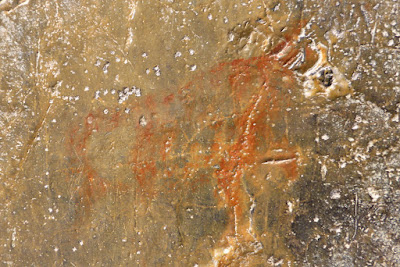The signs at the start. Today, all the dogs we saw were not on a leash. At least we weren't buzzed by a drone.
Even before reaching the mouth of Grotto Canyon we passed a small wash that bore the scars of the floods.
And then a larger wash, but still not the big show.
Today was even smokier than yesterday. The wildfires, although not approaching Canmore, weren't that far away as the raven flies.
Joan and I reached a bench that overlooked the main outflow.
We scrambled down a boot-beaten path into the gravel meadow, and after heading uphill a short distance, I took this picture looking back.
Where the flood plain narrowed into the constricted canyon Joan and I were forced to clamber over a boulder. Then we saw the rock-filled creek bed, with no water in sight. It created a broad road here in the lower reaches.
The canyon quickly narrowed.
The walk to the waterfall was uneventful. Here are two photos of it from 2011:
Water was flowing today as well, even in the dry weather, so it's likely spring fed. Joan and I continued to the left, away from the waterfall,
and met a great surprise. A rock garden had sprouted after the flood! (Click on the image to enlarge.)
The fad of creating balancing rocks
and fanciful shapes, such as this rock person,
had caught on here.
The canyon doglegged to the right, and yet more rock assemblies presented themselves.
We passed a family busy adding more, one per person.
Joan and I continued up, and beyond the rock garden there were few other people around.
We passed this tree island. It's a non-lithic hoodoo, and who knows how much longer it will survive?
Grotto Canyon offers more challenging, or at least taller, rock climbing than Heart Creek.
Past the climbing wall the proportion of large boulders steadily increased -- the heaviest objects will fall out of a flood first. Joan and I would stop now and then to choose our route, around or on top of them. Now there were no other hikers.
We encountered our first pika of the trip. Yay!
The canyon goes as far as you care to take it.
We stopped for lunch, and saw our second pika.
And a moth visited us.
It was time to head back. All three rock climbers were on the cliff face now. Soon after passing them we met a couple from Mexico City. It was the husband's birthday, and he was having a great time. His wife was ready to turn around, even if it was his birthday, but we mentioned the climbers ahead, and she agreed to go that far. They had come to Canada in part to get away from Mexico City's awful air pollution, but today offered no change!
We saw the other side of the rock garden on the return.
After we passed the waterfall a raven flew overhead, close enough for us to hear the whooshing of its wing beats. Then, paying attention to the directions from Gillean Daffern's guidebook, we finally saw the ochre pictographs on the canyon wall for the first time in either this or the 2011 trip. They are easy to overlook if you're not searching for them.
These pictographs -- symbols painted onto rock rather than carved into it -- are estimated to be 500 to 1,300 years old, so it's amazing that they have survived at all, especially because they are within reach of hikers. The presence of a Kokopelli, a flutist human figure, indicates a Hopi origin, confirming the story in The Book of Hopi of a clan that journeyed north to a land of ice and rock. The fronds on the head make me think this image may be the Kokopelli.
A line of figures.
Bison.
An alternative proposal was that the local Stoney Indians visited the Hopi and brought the Kokopelli idea back with them.
This picture taken further down shows a log jam created by the flood.
Joan and I arrived back at the car well satisfied with all that we had seen. Given the flood, we hadn't expected much, and today was a good increment of effort over yesterday. On the way back to town we bought three chocolate bars at Le Chocolatier, a mandatory stop, for use in later days.
































No comments:
Post a Comment
Comments may not appear immediately as they are moderated by the author to eliminate spam. Please, no commercial links!